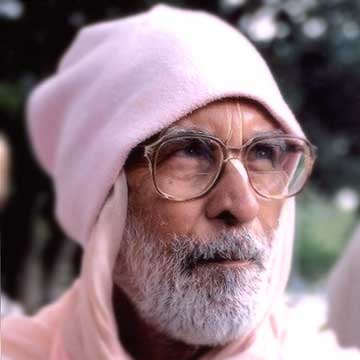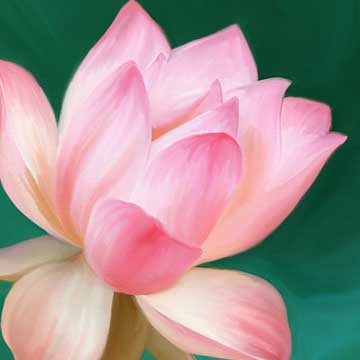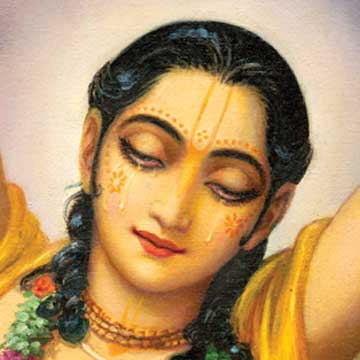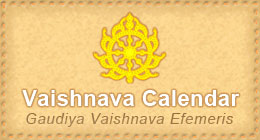The Disappearance Day of Sri Srimad Bhakti Prajnana Kesava Maharaja
- Details
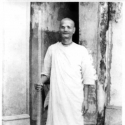
Despite his being very rasika, if someone would say anything against his Guru Maharaja, Srila Bhaktisiddhanta Sarasvati Thakura, my Gurudeva would become like a thunderbolt. Once someone (from the group of sahajiya babajis) *[See endnote 2] wrote an article and made some propaganda, saying, "Oh, members of the Gaudiya Matha don't know anything. They only suck on the dry skin of the mango, while we babajis are drinking the rasa of Krsna's pastimes...
The Disappearance Day of Srila Bhakti Prajnana Kesava Maharaja
- Details

We do not understand the value of guru, and especially of siksa-guru. If diksa and siksa-guru are the same person, that is a wonderful position. The importance of siksa-guru should be realized. He teaches his disciple in visrambha-bhava, intimacy. He does not have the awe and reverence relationship with his siksa disciple. I was very open and frank with my Gurudeva. I asked him many questions from texts such as Sri Ujjvala-nilamani...
By His Mercy
- Details

It is only by my Gurudeva's mercy that I was able to translate Jaiva-dharma from Bengali to Hindi. Now, by his mercy only, Jaiva-dharma and other books of Srila Bhaktivinoda Thakura, like Sri Bhajana-rahasya, are being translated in so many languages, like English, French, German, Spanish and Chinese. This is all his mercy...
Deep Teachings at Gambira
- Details
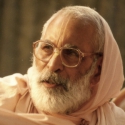
I remember when I used to come with my param-aradyatama (most worshippable) Sri Gurudeva and his disciples to Purusottama-ksetra during the Ratha-yatra Chariot Festival, and after that we all returned here for one month to observe Purusottama-vrata, the vows of this month...
Why Obeisances? Sri Damodarastakam Verse 1
- Details

In this Damodarastakam, Sri Satyavrata Muni is offering obeisances to the lotus feet of Sri Krsna, the Supreme Personality of Godhead - Nanda-nandana, Yasoda-nandana. Yasoda-nandana plays in the forests of Vrndavana, Nandagrama and Varsana. Here, Satyavrata Muni especially refers to His Gokula-Mahavana pastimes, which are so beautiful...
Srila Bhakti Prajnana Kesava Gosvami Maharaja
- Details

Although my Gurudeva has unlimited transcendental qualities, his wonderful speciality, his best quality, was his unprecedented guru-nistha, his faith and loyalty to his Guru. Such faith and loyalty is the backbone of bhakti. Unless one has faith in one's own spiritual master, one cannot come even close to having bhakti. We could see the guru-nistha of our Gurudeva, especially at the samadhi place of his Guru Maharaja, Srila Bhaktisiddhanta Sarasvati Thakura Prabhupada, in Mayapura-dhama...
A Phoned Puspanjali
- Details

When my Gurudeva was in this world, I could not realize his glories, but now I am realizing them. I am very unqualified and unworthy, and I am without knowledge of any Western languages besides a little English. Still, due to the very small amount of service I rendered to the lotus feet of my Gurudeva, you see that so many devotees throughout the world are hearing from me. Also, I am writing volumes of books, and when I read those very same books, I am in great wonder how they could have come from my hand and heart...
Disappearance Day of Srila Bhakti Prajnana Kesava Gosvami Maharaja
- Details
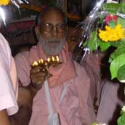
Today is the first day of our Urja-vrata, niyama seva and Damodara-vrata. Today is also Saradiya-Purnima, the day leading to the full moon night, when Lord Sri Krsna began His performance of the Rasa Dance. Today is also the disappearance day of my Gurudeva, nitya-lila pravista om visnupada Sri Srimad Bhakti Prajnana Kesava Gosvami Maharaja...
The Disappearance Day of Sri Srimad Bhakti Prajnana Kesava Maharaja
- Details

"We pray at the lotus feet of that form of Radhalingita-Radhacihnita Sri Krsna, who is embraced and marked by Sri Radhika. When Srimati Radhika, the personification of mahabhava, displayed mana (Her mood of jealous anger), and He became thoroughly immersed in separation from Her, His own dark complexion vanished and He assumed Her bright, golden luster...
The Disappearance Day of Srila Raghunatha dasa Gosvami
- Details
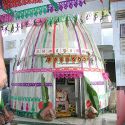
Srila Raghunatha dasa Gosvami is an eternal associate of Sri Caitanya Mahaprabhu and also of Krsna, but in the pastimes of Mahaprabhu, he showed the sadhana-bhajana for attaining the elevated devotional stages of bhava and prema. If a sadhaka sincerely desires to engage in bhajana to achieve the direct association of the Supreme Lord without delay – perhaps in only one or two births – then he should engage in bhajana just as Raghunatha dasa Gosvami did...
Sri Krsna Disguised as a Demigoddess
- Details
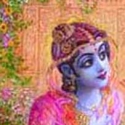
Sri Krsna said, "Oh Devi, Oh You who are the most qualified girl in the three worlds, even including the Vaikuntha planets. Who in her right mind would dare to consider herself equal to You, for there is no one equal to You in this world...
Don't Hear From Them
- Details
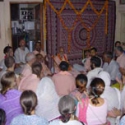
Srimati Radharani is prema-samput, the treasure-chest of love, and She is revealing Her heart to us by describing what is prema. Our guru-parampara has very mercifully collected all this, and they have opened their realizations to us. If any of us can get one drop of this mood, our lives will be successful...
The Disappearance of Sripad Svarupa Damodara Maharaja
- Details
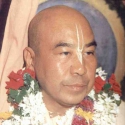
He was really a Vaisnava, even from his home-life. I have seen this in Sripad Gour Govinda Maharaja, and he was like this also. They are real Vaisnavas. They followed the principles of their Guru in the real sense. They never accepted what Iskcon is now propagating...
The 'Heavenly Damsel' Speaks
- Details
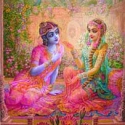
Krsna as the heavenly damsel said, "Oh supremely beautiful Radha, I am actually from Svarga (the heavenly planets). I came here because I have a doubt about a certain subject, and apart from You, nobody in the entire world can completely fulfill My desire to have this doubt dispelled. That is why I have come down to this Earth planet...
The Real Reason
- Details
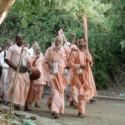
Yesterday I explained the reasons why Krishna left Vraja and did not return after killing Kamsa; and why He did not even visit there from time to time. I explained why He did not bring the Vrajavasis to Mathura, as He had previously brought the Mathuravasis to Dvaraka-in a moment-during the night. You should know all this first, and then you will be able to taste why Krishna wanted to pacify the gopis...
Why Did Krishna Not Return?
- Details

Krishna has left Vrindavana for Mathura. Srila Visvanatha Cakravarti Thakura has explained in his commentary that all the Vrajabasis, especially the gopas and gopis, and Krishna's father and mother, are feeling so much separation that is beyond the limit of explanation. It is said that the Vrajabasis sent a swan as a messenger to Mathura, and the Puranas say that they sent many messengers; but Srimad Bhagavatam has not told so...
Page 40 of 48

